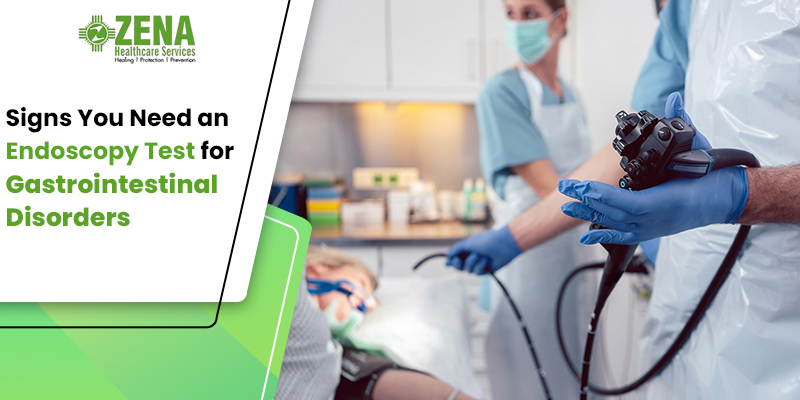
Signs You Need an Endoscopy Test for Gastrointestinal Disorders
While random stomach aches and bloating is one of the common problems in Indian households, many people often tend to ignore the signs of severe medical conditions like gastrointestinal disorders. Apart from bloating and cramps, if you are experiencing long-lasting nausea or unexplained weight loss, there is a high chance that you need an endoscopy test for gastrointestinal diseases at Zena Healthcare.
But what is a gastrointestinal disease, and what can happen if you do not allow medical experts to detect your body organs to cure the disease? In this blog, we will tell you everything you must know about gastrointestinal diseases and how endoscopy can help.
Keep reading to learn more.
What Are Gastrointestinal Disorders?
In simple words, Gastrointestinal disorders are health conditions that directly affect the digestive system. These disorders affect the stomach, liver, pancreas, esophagus, gallbladder, and intestines.
Some of the common Gastrointestinal Disorders are:
- Functional Disorders
Such disorders allow the GI tract to function – as in the case of an Irritable Bowel Syndrome – where there is stomach ache or bloating alongside alteration in bowel movements. Another potential disorder is Functional Dyspepsia, identified with an upset stomach, episodes of vomiting, and, to some extent, feeling complete.
- Inflammatory and Autoimmune Diseases
This contains Crohn’s Disease alongside Ulcerative Colitis. Both can cause chronic inflammation in various parts of the digestive system. There are some symptoms like blood in stool, persistent fatigue, looseness of stool, and abdominal cramps.
Some people also have Celiac Disease. In this case, the individual experiences gastric symptoms brought on by gluten. The typical symptom that indicates the need for an endoscopy test is diarrhea, which is associated with a lack of proper nutrient intake and significant weight loss.
- Structural Disorders
These are related to problems that can be identified through medical imaging or physically checking the body. You may be suffering from Acid Reflux / GERD (Gastroesophageal Reflux Disease). Common symptoms include chest pain, a burning sensation, and bitter fluid in the mouth.
Numerous individuals also have a tough time dealing with Hiatal Hernia and Diverticulosis. Issues such as stomach acid rising into the esophagus, abdominal pain, a sensation of fullness, and, in rare cases, bleeding might occur.
But, How Can Endoscopy Help?
As you may already know, Endoscopy is a simple medical procedure that allows medical experts to examine the insides of your body using a thin tube and light. This tube has an attached camera that enables your medical specialist to check the status of your health in real time.
Typically, there are a few popular types of endoscopies:
- Upper GI Endoscopy (EGD) to examine the Esophagus, stomach, and upper small intestine.
- Sigmoidoscopy to explore the lower part of the colon.
- Colonoscopy to examine the large intestine and rectum.
- Finally, Capsule Endoscopy uses a swallowing camera capsule to explore the small intestine.
(Also read from our previous blogs: Colonoscopy Test in Bhubaneswar: What Should You Expect?)
What Can Endoscopy Detect?
Other chronic digestive issues needing endoscopy are mentioned below:
- Abnormal bacteria and infection
- Bleeding in the GI tract
- Celiac disease symptoms
- Tumors
- Ulcers
What makes it so beneficial?
When you get an expert endoscopy in Bhubaneswar, you get the following benefits:
- Early detection
- Accurate diagnosis
- Safe
- No-surgeries
Signs You Might Need an Endoscopy Test
Now, as we mentioned earlier, a few symptoms, like bloating, are common causes. However, regular bloating with the following signs would require an endoscopy:
- Burning sensation in the throat or chest and sour mouth, especially after meals.
- Unexplained weight loss without working out or changing the diet plans.
- Blood in your stool or vomit.
- Long-lasting abdominal pain.
- Trouble or painful swallowing.
How to Prepare for an Endoscopy and What to Expect?
Here at Zena Healthcare, we take bookings. So, once you have your appointment booked, you will then go through the following steps:
- Fast for at least 6-8 hours prior to taking the test.
- Your medical technician might give you laxatives to clear your bowel, based on the type of endoscopy.
- You will be sedated, and the expert will insert the tube through your mouth or rectum.
- The specialists will detect issues and also collect samples during this process.
- Once the diagnosis is over, you will need to rest for a few hours. Eventually, you can resume eating light food, as the doctor advised.
Bottom Line
Choosing Zena Healthcare in Bhubaneswar guarantees accurate results, professional diagnosis, and expert advice that will help you cure your health problems. If you experience any of the abovementioned symptoms for over 2-3 days, you must immediately get an Endoscopy test for gastrointestinal diseases.
Book your appointment with Zena Healthcare.
